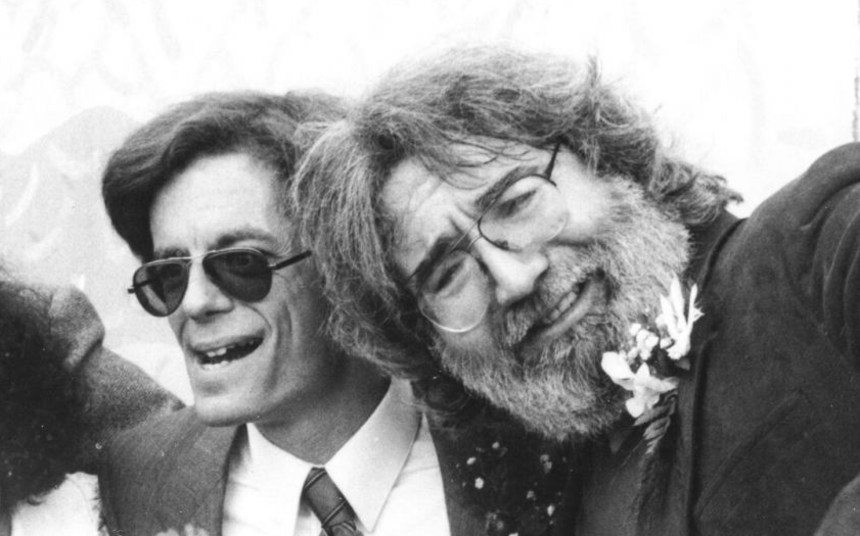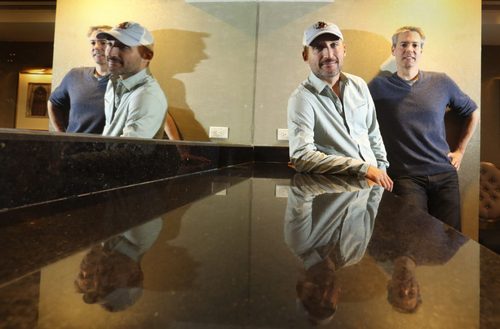Interview: Listen to Music On Screen - Author Dennis McNally, Archivist David Lemieux, and Director Amir Bar-Lev on LONG STRANGE TRIP

Throughout this trilogy of podcast episodes, I’ve spoken about musical sources and the faraway fruits of their trajectories via music documentaries. In the first installment, Rumble spoke to the varying multi-cultural influences on roots music at the turn of the 20th century, as well as the societal impact of these early underdog American musical pioneers. A very different film, A Story of Sahel Sounds, implied the Alan Lomax story - the man who set out on the great frontier, not to conquer, but to capture the voices at the heart of the country by recording them onto and committing them to history for future generations to expand upon.
A Story of Sahel Sounds is a very different type of journey that takes its audience into West Africa in a Lomax-inspired search for the heart of a country that both influenced the Americas and in present day, musically re-interprets its own reflection. Tokyo Idols, the third film of that episode, while not having much to do with the aforementioned subjects, delves further into space in time, taking us to present day Japan where a shamelessly commercial top-down musical landscape informs the almost-dystopic approach to popular, or ‘pop’ music.
The second episode in this series has as its guest, Tony Palmer, one the founding visionaries of music films as a genre - the ‘‘rockumentary’ as we often call it - who in the sixties, was able to capture much of the revolutionary excitement of the culture's changing of the guard when pop music was hijacked from the recording studios and given to the people, who in garages and streets defined for themselves how the newly-emerging rock & roll sound and spirit would play out.
Given that much of Palmer’s filming took place in England, under the fervent encouragement of his friend, John Lennon, in addition to discussing Palmer’s fascinating career, our conversation explores the crucial evolutionary force of interpretation and reinterpretation; much like with A Story of Sahel Sounds, only through the British reimagining of roots, rhythm, and blues, and the impact it reflected back onto American Rock and Roll.
In today’s final series installment - which, if I’m being honest, could expand into this entire podcast - we’ll look into some pivotal forces that bridged the gap between America’s roots pioneers to the 60s counter cultural explosion that turned on a multitude of minds, freaked out countless squares, and at large, woke up the consciousness of an entire generation and generations to come; links in a chain that began with literal outsiders - in the case of the native Americans, we’re speaking of outsiders to their own land - to figurative outsiders; future generations who identified with an aging plight for freedom.
After a brief discussion of the 40s and 50s - the first two decades to reap the benefits of recorded music and its double-edged industrialization, and of course, these are also the early years of a nation lost after the morally compromising, sobering effects of WWII - having spent most of these discussions on American music via international musical movements, we’ll loop back to the states for a look at the fruits of cultural freedom via, what many feel to be the most American band of the 20th century, in theme, spirit, and bloodline: The Grateful Dead.
For what can essentially be reduced to a rock and roll band, The Grateful Dead is a heavy topic, the branches of which, could easily make up a stacked university syllabus of worthy studies. It is for this reason that many outsiders shy away from taking on The Dead as subjects for their curiosity or fanhood and it is certainly the reason that the brand new Amazon documentary, Long Strange Trip, is a full four hours in length; though after watching, many deadheads will consider this running time to be skillfully tight.
The film came out last Friday, so it is my hope that some of you have already taken 4 hours out of your last weeks to check out Amir Bar-Lev’s incredible documentary, but if you have yet to, that is something you’re finally able to do. At the film’s Sundance premiere back in January, I was able to speak to director, Amir Bar-Lev as well as Bob Weir, Steve Parish, Trixie Garcia (Jerry’s daughter), and at that point, I did my best to avoid as much spoiler territory as possible, knowing that the film wouldn't be available to the public for another five months. When I was able to revisit the film with Amir last May at Toronto’s Hot Docs Film Festival, I was glad to be able to do so with the knowledge that those listening to our second conversation may now do so having seeing his excellent film, which is very much not for Deadheads only - far from!
In addition to the return of Bar-Lev, there are two more very special guests joining the conversation. One is David Lemieux, who as many Deadheads will attest to, is the band’s official archivist helming the vault, as it's literally referred. The job used to belong to Dead diehard, Dick Latvala, who released choice shows since 1993 under the series label, “Dick’s Pick’s, until his death in ‘99, at which point, Lemieux stepped in to continue the collection, which he eventually renamed “Dave’s Picks”. To this day, Dave still remasters and releases choice shows and, in the last few years, he worked with Amir as the helpful gatekeeper of the holy vault and co-producer of the film’s soundtrack.
Lastly, I’m especially excited to be joined by author, Dennis McNally, who in addition to having acted as the band’s publicist from 1984 until the death of Jerry Garcia in 1995, proved to be one of the band’s most significant historians, with his thoroughly insightful biography: A Long Strange Trip: The Inside History of the Grateful Dead, released in 2001. In addition to this book, McNally also wrote an impeccable biography on Jack Kerouac, called Desolate Angel, and an exquisite account of the history of American counterculture, or “cultural freedom” in his ambitious book: On Highway 61: Music, Race, and the Evolution of Cultural Freedom, published in 2014.
Contents:
0:00 - Intro
9:00 - Dennis
43:30 - Amir & Dave
Amir Bar-Lev and David Lemieux pictured below at the Park Hyatt hotel for the Hot Docs festival in May. Photo by RICHARD LAUTENS








